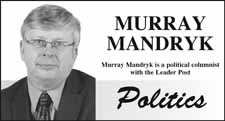Change does not come easy for politicians nor does it come easy for the people that elected them.
To retire from politics is never an easy decision. Dedicating one's best years to fishbowl world of public service requires a special resolve and commitment. It's not easy to walk away from that.
But change does not necessarily come easy for voters, either, who have to trust that the person they elect will truly be an effective, honest, hard-working representative in sync with their needs and views.
Many rural voters are now losing those effective voices.
Consider the solid representation Melville-Saltcoats voters have received from former agriculture minister Bob Bjornerud who will retire after the next general election. Similarly, Wood River voters will lose Yogi Huyghebaert. And Melfort voters lost former finance minister Rod Gantefoer to retirement after the 2011 election.
Now, Canora-Pelly voters will face the same dilemma as current Finance and Deputy Premier Ken Krawetz - the only MLA this 19-year-old riding has ever had - has announced his retirement.
However, the significance of Krawetz's departure after the next election - likely to be held in April 2016 - actually goes beyond the loss of one influential MLA in one particular seat. Krawetz's political career has very much represented the transformation of Saskatchewan politics - especially in rural Saskatchewan.
First elected in 1995 as a Liberal MLA by a meagre 66 votes, Krawetz's initial entry into the legislature represented a major transition.
Liberals - especially rural Liberals - had become all but extinct in this province. In fact, the division for the two decades prior was very clear, with the Progressive Conservatives dominating most rural regions and the NDP dominating most of the urban seats.
But with the incompetence and debt that accompanied the Grant Devine government prior to the 1991 election and with former PC MLA fraud trials in the news going into the 1995 election, voters were clearly looking for something different.
Yet, while trust in the PCs bottomed out, rural voters were equally untrusting of the NDP government that closed 52 rural hospitals in 1993. Notwithstanding his candidacy in a seat in the middle of what was once known as "red square" _ the last NDP bastion in rural Saskatchewan consisting of the seats around Yorkton - Krawetz's win in Canora-Pelly represented a major change.
That Canora-Pelly voters were willing to take a chance on the former educator and businessman as a Liberal said much. But that they would more than willing to forgive him for leaving the Liberal ranks and joining Progressive Conservatives to form the Saskatchewan Party just two years later said even more.
After two years of upheaval under leaders Lynda Haverstock and Jim Melenchuk, it became obvious that divided opposition ranks would never unseat the still-powerful NDP.
So along with Kelvington-Wadena's June Draude, Gantefoer and Bjornerud, Krawetz joined PC MLAs Bill Boyd, Dan D'Autremont, Don Toth and Ben Heppner to form the Sask. Party in August 1997. In fact, Krawetz became the interim opposition leader, realizing a dream of leading a political party that had eluded him a year earlier when he lost to Melenchuk for the Liberal leadership.
To suggest it was a huge gamble for Krawetz to jump ship from the party in which voters elected him is a huge understatement. But Canora-Pelly voters understood his reasoning and shared his vision, rewarding him with a 2,000-plus vote win in 1999.
Voters also re-elected him in 2003 and in 2007 when the Sask. Party was rewarded with government. Krawetz became education minister and Deputy Leader. He was further rewarded with another re-election in 2011 and the finance portfolio.
Canora-Pelly voters are losing more than a solid, effective representative. They are losing someone who, in many ways, has changed the face of Saskatchewan's politics.
Murray Mandryk has been covering provincial politics for over 22 years.



